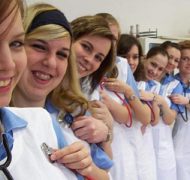Simplicity at Work: Focus on What’s Most Important
Blog / Produced by The High Calling
My mother retired from nursing almost five years ago now. She still gets patients, though. She’ll chuckle as she tells you that—how sometimes she has to have patience with her patients. It’s true, though. Mom is a long-suffering sort of lady. So when the phone rings and it’s someone who wants to know how best to deal with a phlegmy cough or when she runs into someone complaining of a bad knee in the produce aisle of the Food Lion, Mom will just listen. She’ll nod a little, then purse her lips, then shake her head as though whatever’s just been said to her was the worst news she’d ever heard.
She worked at the local doctor’s office for almost thirty-five years. Saw nearly every man, woman, and child within a dozen miles. Watched them grow up and grow old and trade one world for the next for close to thirty-five years. Thirty-five years of going in at 7 a.m. and limping home at 6 p.m., of scolding those whose diets consisted of little more than carbs and sugar while eating a candy bar for lunch because that’s all they had time for, of hearing over and over again the same long list of aches and pains and fears and always—always—offering that same series of quiet expressions: the nod, the purse, the sad shake of the head.
She told me once that the biggest fear any doctor or nurse has isn’t that they’ll get sued or miss a diagnosis or even that a patient would die on them. It’s that they’ll one day stop caring for the people they see, the ones who are rushed in and out of the observation rooms like some two-legged cattle. That was always Mom’s biggest worry. I can understand that. The sheer weight of all that responsibility? That constant parade of human misery, day in and day out? I would think the temptation to grow a little cold and become a little distant would be great. Would be accepted, even. And it is. Mom said she couldn’t count the number of times a doctor told her that if she never bothered to build a strong wall of separation between herself and her patients, she would burn out within the first five years.
But she never did build that wall. These were her neighbors, after all. In many cases, her kin. These were the people she went to church with every Sunday and ran into while rolling a shopping cart through the produce section every Friday evening. She couldn’t not care. To Mom, caring was as much a part of her job as knowing how to take someone’s blood pressure.
She went to school, of course. Got her degree. You can’t be stupid and be a nurse or a doctor, even though she’ll chuckle and say there are plenty of people who are borderline. The human body is an amazing creation, all those intricate parts working as a whole. There was always some new technique to learn or some new class to take, new medicines and diagnoses to become familiar with.
But here’s the thing—Mom said nursing was always a lot easier for her than most. The key was to focus on what was most important. Despite what you may think, the techniques and classes and medicines and diagnoses weren’t the important things at all. Not by a long shot. It was a lot simpler than that.
My mother was and remains the model of simplicity, both in her life now and her work then. And the key to being a good nurse? Same thing.
“Don’t worry about the blood,” she told me, “worry about the scars. The scars are what’s important.”
Which I think was why she was so popular at the doctor’s office, and why so many wanted to see her and no one else. Because only Mom would know that it really wasn’t the farmer’s stiff joints that was the problem, it was the fact that the farmer’s son had chosen college over the family business. And it wasn’t really the persistent cough in the housewife, it was how lost she felt in life. And it wasn’t the broken arm in the teenage boy nearly as much as it was him just trying to get his parents’ attention for once.
They’d go in for a bandage and get a shoulder to lean on thrown in. They’d get checked and listened to at the same time. And they’d always go out with a smile.
Simple, Mom will tell me. I will tell her the same. And then we’ll nod a little and purse our lips. We’ll shake our heads at how simple most everything really is, and how very profound.
Simplicity at Work
In our complicated, 21st century, high-tech, high-speed world, people have begun to crave a simpler approach to life and work. In the series Simplicity at Work, The High Calling explores simplicity in the places we work and the ways we work; and, perhaps more subtly, we want to explore simplicity at work in us through a variety of stories that reveal ways people find freedom and success when they simplify. Join us for Bible reflections, featured articles, and discussion. Invite your colleagues to do the same.
Image by Vlastimil Ott. Used with permission. Sourced via Flickr.





